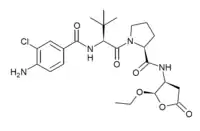 | |
| Clinical data | |
|---|---|
| Routes of administration | Oral |
| Identifiers | |
| |
| CAS Number | |
| PubChem CID | |
| ChemSpider | |
| UNII | |
| KEGG | |
| Chemical and physical data | |
| Formula | C24H33ClN4O6 |
| Molar mass | 509.00 g·mol−1 |
| 3D model (JSmol) | |
| |
| |
Belnacasan (VX-765) is a drug developed by Vertex Pharmaceuticals which acts as a potent and selective inhibitor of the enzyme caspase 1. This enzyme is involved in inflammation and cell death, and consequently blocking its action may be useful for various medical applications, including treatment of epilepsy, arthritis, aiding recovery from heart attack and slowing the progression of Alzheimer's disease. Belnacasan is an orally active prodrug, being converted in the body to the active drug VRT-043198 (O-desethyl-belnacasan). However while belnacasan has proved well tolerated in human clinical trials, it has not shown sufficient efficacy to be approved for use for any of the applications suggested to date, though research continues into possible future uses of this or similar drugs.[1][2][3][4][5]
References
- ↑ Wannamaker W, Davies R, Namchuk M, Pollard J, Ford P, Ku G, Decker C, Charifson P, Weber P, Germann UA, Kuida K, Randle JC (May 2007). "(S)-1-((S)-2-{[1-(4-amino-3-chloro-phenyl)-methanoyl]-amino}-3,3-dimethyl-butanoyl)-pyrrolidine-2-carboxylic acid ((2R,3S)-2-ethoxy-5-oxo-tetrahydro-furan-3-yl)-amide (VX-765), an orally available selective interleukin (IL)-converting enzyme/caspase-1 inhibitor, exhibits potent anti-inflammatory activities by inhibiting the release of IL-1beta and IL-18". The Journal of Pharmacology and Experimental Therapeutics. 321 (2): 509–16. doi:10.1124/jpet.106.111344. PMID 17289835. S2CID 36419606.
- ↑ Cornelis S, Kersse K, Festjens N, Lamkanfi M, Vandenabeele P (2007). "Inflammatory caspases: targets for novel therapies". Current Pharmaceutical Design. 13 (4): 367–85. doi:10.2174/138161207780163006. PMID 17311555.
- ↑ Yang XM, Downey JM, Cohen MV, Housley NA, Alvarez DF, Audia JP (November 2017). "The Highly Selective Caspase-1 Inhibitor VX-765 Provides Additive Protection Against Myocardial Infarction in Rat Hearts When Combined With a Platelet Inhibitor". Journal of Cardiovascular Pharmacology and Therapeutics. 22 (6): 574–578. doi:10.1177/1074248417702890. PMC 5817632. PMID 28399648.
- ↑ Audia JP, Yang XM, Crockett ES, Housley N, Haq EU, O'Donnell K, Cohen MV, Downey JM, Alvarez DF (July 2018). "12 receptor antagonist-treated rats provides long-term reduction in myocardial infarct size and preservation of ventricular function". Basic Research in Cardiology. 113 (5): 32. doi:10.1007/s00395-018-0692-z. PMC 6396295. PMID 29992382.
- ↑ Flores J, Noël A, Foveau B, Lynham J, Lecrux C, LeBlanc AC (September 2018). "Caspase-1 inhibition alleviates cognitive impairment and neuropathology in an Alzheimer's disease mouse model". Nature Communications. 9 (1): 3916. Bibcode:2018NatCo...9.3916F. doi:10.1038/s41467-018-06449-x. PMC 6156230. PMID 30254377.